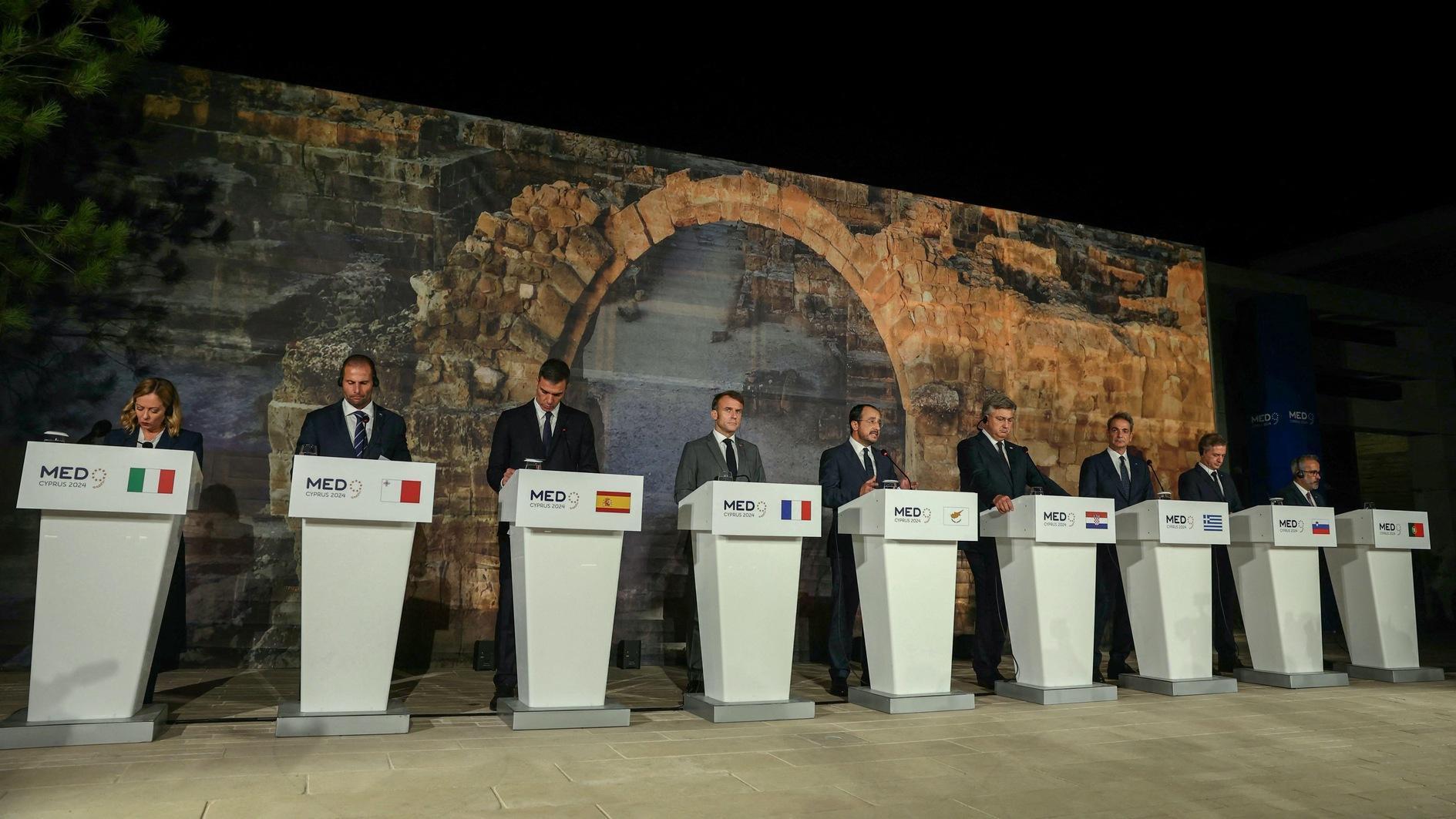
(L-R) Italy's Prime Minister Giorgia Meloni, Malta's Prime Minister Robert Abela, Spain's Prime Minister Pedro Sanchez, France's President Emmanuel Macron, Cyprus' President Nikos Christodoulides, Croatia's President Zoran Milanovic, Greece's Prime Minister Kyriakos Mitsotakis, Slovenia's Prime Minister Robert Golob, and Portugal's Foreign Minister Paulo Rangelas hold a press conference after the MED9 Summit in the Cypriot city of Paphos.
Leaders from nine European Mediterranean countries convened Friday in Cyprus, issuing an urgent call for an end to hostilities in Gaza and Lebanon while strongly condemning recent Israeli attacks on U.N. peacekeepers in southern Lebanon.
The summit, known as MED9, brought together leaders from France, Italy, Spain, Portugal, Greece, Cyprus, Malta, Slovenia, and Croatia, along with Jordan's King Abdullah II, in the coastal city of Paphos.
French President Emmanuel Macron, Italian Prime Minister Giorgia Meloni, and Spanish Prime Minister Pedro Sanchez expressed outrage over what they termed "unacceptable" Israeli fire on U.N. peacekeepers. The incident on Thursday resulted in injuries to two UNIFIL personnel, with two more hurt in subsequent explosions near an observation tower on Friday.
"It is absolutely unacceptable that U.N. troops are deliberately targeted by the Israeli armed forces," Macron declared, warning that France "will not tolerate" a repeat of such incidents.
In a joint statement, the three leaders condemned the attacks, stating they violate U.N. Security Council Resolution 1701, which mandates that only U.N. forces and the Lebanese army should be present in southernmost Lebanon.
"Those attacks are unjustifiable and shall immediately come to an end," the statement demanded, calling for "an immediate ceasefire."
Israel's military acknowledged on Friday that its soldiers had fired toward a "threat" and hit a UNIFIL post. A day earlier, they claimed to have fired in the area of the U.N. base, alleging Hezbollah fighters were operating nearby.
Greek Cypriot President Nikos Christodoulides, opening the summit, emphasized the proximity of the conflict, stating, "Only a few miles away from Cyprus, we have a war. We have a difficult situation."
The leaders unanimously called for an end to hostilities in Gaza and Lebanon and urged a resumption of peace talks. Macron stressed that a "ceasefire is indispensable for both Gaza and Lebanon."
The French president reiterated his controversial stance on halting weapons exports to the region, saying that "stopping the export of weapons" used in Gaza and Lebanon was the only way to end fighting there.
He clarified, "This is not in any way a call to disarm Israel against the threats against this country and its people, our friends."
The summit also addressed the critical issue of humanitarian aid to Gaza, with Jordan presenting a new plan. Macron confirmed France's commitment to contribute to this effort.
Meanwhile, in Laos, U.S. Secretary of State Antony Blinken expressed hope for a diplomatic solution in Lebanon and prevention of a broader conflict. He reiterated Israel's right to defend itself against Hezbollah but voiced alarm over the worsening humanitarian situation.
As tensions continue to escalate, Hezbollah claimed on Saturday to have launched a salvo of missiles at an Israeli military base south of Haifa, as Israelis marked Yom Kippur. The militant group also issued a warning to Israelis to stay away from army sites in residential areas in northern Israel.
The ongoing conflict has taken a severe toll, with Gaza's civil defense agency reporting on Friday that at least 30 people were killed by Israeli strikes throughout the day in northern Gaza's Jabalia town and refugee camp. The agency's spokesman, Mahmud Bassal, said a strike before 9:40 pm local time left "12 dead, including women and children" in the town, with 14 people still missing and likely trapped under rubble.
Earlier strikes reportedly hit "eight schools" in the camp that were serving as shelters for displaced people, resulting in at least 18 deaths and numerous injuries.
The conflict, which began on Oct. 7, 2023, following a Hamas attack on Israel, has resulted in widespread destruction across Gaza. Israel's retaliatory military assault has displaced almost all of Gaza's 2.4 million civilians at least once in the past year, amid continuous bombardment by land, air, and sea.